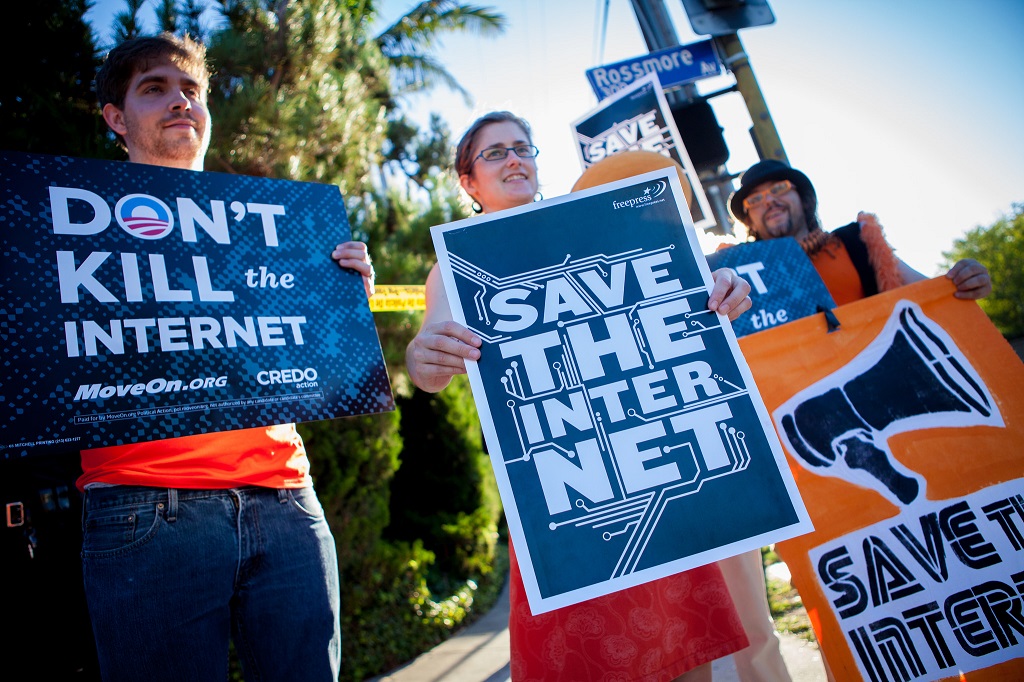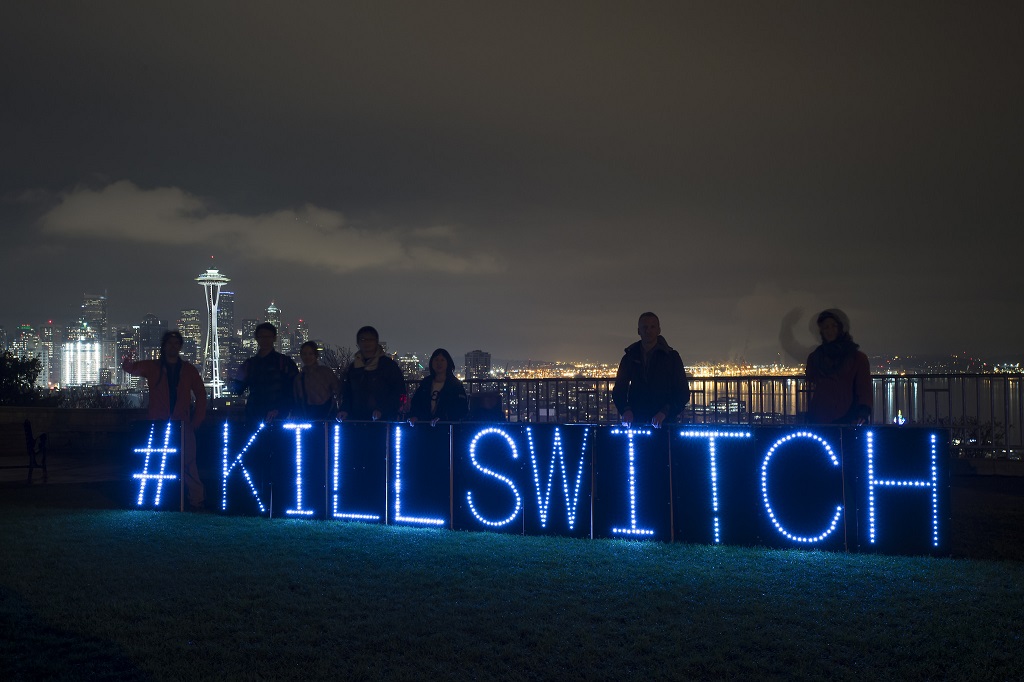The battle for network neutrality - a chance to return
American politicians have introduced a new bill that invalidates the FCC's decision to repeal the rules of net neutrality in 2017.
We understand whether Net Neutrality has a chance of return.

/ Flickr / Free Press / CC BY-SA
')
In February 2015, the Federal Communications Commission (FCC) introduced Net Neutrality rules. It has forbidden Internet providers to give priority to traffic from any sources (for example, streaming platforms) and to take an additional fee for access to services on the network. Then the idea was supported by more than 80 thousand organizations. Among them were major cloud providers and IT companies.
But the concept of Net Neutrality did not last long. Two years later - December 14, 2017 - the FCC decided to consider access to the Internet information service. Under the law on communications, providers received more freedoms in setting tariffs, and the rules of net neutrality ceased to apply to them.
The FCC decision led to public protests - people were convinced that it would lead to an uncontrolled increase in prices for Internet services. Against the cancellation of Net Neutrality , even large IT corporations and politicians spoke out . In 2018, an initiative group of IT companies led by Mozilla filed a lawsuit against the Commission. The governments of thirteen states (for example, California and Vermont ) tried to enact their own laws, leaving the rules of net neutrality in force.
The fight does not stop even after a year and a half. One of the fresh initiatives designed to return the rules of Net Neutrality was launched in mid-March at the federal level.
In March, representatives of the US Democratic Party put forward a new bill - the act “Save the Internet Act”. It is a small three-page document and requires you to restore the net neutrality decree of 2015 and return legal force to all the rules that were canceled at the FCC two years earlier. The text of the bill is available on the congress website.
The proposal of the Democrats supported a number of non-profit organizations. According to the representative of the Common Cause group and the former FCC head Michael Copps, the cancellation of the network neutrality rules has led to providers lowering the connection speed for customers who use the services of competitors. In his opinion, the return of network neutrality will restore a healthy environment on the Internet.
Also, representatives of the eCommerce-community are also speaking for the new bill. They believe that in unequal conditions, small companies do not have the capacity and resources to compete with large retailers who can negotiate with providers.

/ Flickr / Backbone Campaign / CC BY
Representatives of the Computer and Communications Industry Association (CCIA), which includes large cloud providers and IT corporations, also spoke positively about the new act. According to them, the law will protect not only the business, but also customers - consumers will have equal conditions for access to online services.
The return of net neutrality rules is also supported by regular users. In a 2018 survey among thousands of Americans, 86% of respondents opposed providers having the ability to restrict access to certain services or resources.
Not surprisingly, one of the main opponents of the act was made by the Federal Communications Commission. They criticized both the Act itself and the results of a study conducted among Internet users. The FCC said that the rules of network neutrality were too strict with respect to Internet providers and did not meet the requirements of modernity.
The commission said that the cancellation of Net Neutrality had a positive impact on the country's Internet industry. In support of its point of view, the organization cited statistics , according to which 2018 was a record for the volume of the laid fiber, and the download speed on average in the country increased by 36%. The FCC said that a return to past rules will reduce the amount of investment in the development of network technologies and slow down the deployment of 5G networks in the country.
Now the law has every chance to pass both chambers of the congress, - as the Democrats have the majority in the House of Representatives. However, in its current form, the United States President is not likely to sign it, since the administration has still not changed its opinion on the issue of network neutrality.
There is a possibility that the act will be recycled. A number of politicians have already declared their readiness to seek a compromise and make amendments. Perhaps this time the parties will be able to agree and adopt a law that will suit everyone.
We understand whether Net Neutrality has a chance of return.

/ Flickr / Free Press / CC BY-SA
')
Brief background
In February 2015, the Federal Communications Commission (FCC) introduced Net Neutrality rules. It has forbidden Internet providers to give priority to traffic from any sources (for example, streaming platforms) and to take an additional fee for access to services on the network. Then the idea was supported by more than 80 thousand organizations. Among them were major cloud providers and IT companies.
But the concept of Net Neutrality did not last long. Two years later - December 14, 2017 - the FCC decided to consider access to the Internet information service. Under the law on communications, providers received more freedoms in setting tariffs, and the rules of net neutrality ceased to apply to them.
The FCC decision led to public protests - people were convinced that it would lead to an uncontrolled increase in prices for Internet services. Against the cancellation of Net Neutrality , even large IT corporations and politicians spoke out . In 2018, an initiative group of IT companies led by Mozilla filed a lawsuit against the Commission. The governments of thirteen states (for example, California and Vermont ) tried to enact their own laws, leaving the rules of net neutrality in force.
The fight does not stop even after a year and a half. One of the fresh initiatives designed to return the rules of Net Neutrality was launched in mid-March at the federal level.
Reading on the topic in our corporate blog:
New bill
In March, representatives of the US Democratic Party put forward a new bill - the act “Save the Internet Act”. It is a small three-page document and requires you to restore the net neutrality decree of 2015 and return legal force to all the rules that were canceled at the FCC two years earlier. The text of the bill is available on the congress website.
The proposal of the Democrats supported a number of non-profit organizations. According to the representative of the Common Cause group and the former FCC head Michael Copps, the cancellation of the network neutrality rules has led to providers lowering the connection speed for customers who use the services of competitors. In his opinion, the return of network neutrality will restore a healthy environment on the Internet.
Also, representatives of the eCommerce-community are also speaking for the new bill. They believe that in unequal conditions, small companies do not have the capacity and resources to compete with large retailers who can negotiate with providers.

/ Flickr / Backbone Campaign / CC BY
Representatives of the Computer and Communications Industry Association (CCIA), which includes large cloud providers and IT corporations, also spoke positively about the new act. According to them, the law will protect not only the business, but also customers - consumers will have equal conditions for access to online services.
The return of net neutrality rules is also supported by regular users. In a 2018 survey among thousands of Americans, 86% of respondents opposed providers having the ability to restrict access to certain services or resources.
Not surprisingly, one of the main opponents of the act was made by the Federal Communications Commission. They criticized both the Act itself and the results of a study conducted among Internet users. The FCC said that the rules of network neutrality were too strict with respect to Internet providers and did not meet the requirements of modernity.
The commission said that the cancellation of Net Neutrality had a positive impact on the country's Internet industry. In support of its point of view, the organization cited statistics , according to which 2018 was a record for the volume of the laid fiber, and the download speed on average in the country increased by 36%. The FCC said that a return to past rules will reduce the amount of investment in the development of network technologies and slow down the deployment of 5G networks in the country.
Prospects for the bill
Now the law has every chance to pass both chambers of the congress, - as the Democrats have the majority in the House of Representatives. However, in its current form, the United States President is not likely to sign it, since the administration has still not changed its opinion on the issue of network neutrality.
There is a possibility that the act will be recycled. A number of politicians have already declared their readiness to seek a compromise and make amendments. Perhaps this time the parties will be able to agree and adopt a law that will suit everyone.
Posts on a subject from our blog on Habré:
Source: https://habr.com/ru/post/445064/
All Articles